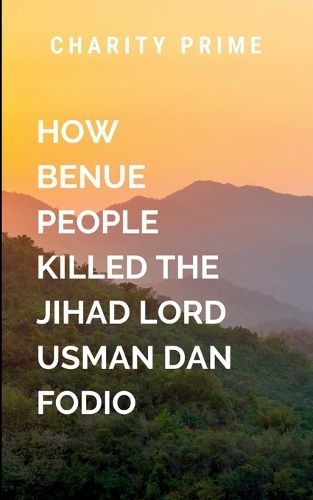Readings Newsletter
Become a Readings Member to make your shopping experience even easier.
Sign in or sign up for free!
You’re not far away from qualifying for FREE standard shipping within Australia
You’ve qualified for FREE standard shipping within Australia
The cart is loading…






This title is printed to order. This book may have been self-published. If so, we cannot guarantee the quality of the content. In the main most books will have gone through the editing process however some may not. We therefore suggest that you be aware of this before ordering this book. If in doubt check either the author or publisher’s details as we are unable to accept any returns unless they are faulty. Please contact us if you have any questions.
How the Benue People Killed the Jihad Lord Called Usman Dan Fodio is a historical narrative that delves into the courageous struggle of the Benue people to defend their land and culture from the encroaching forces of Usman Dan Fodio's jihadist movement. Set in the heart of Nigeria, the book paints a vivid picture of the Benue Valley during the 19th century, where the region's resilience and unity became their greatest strength in the face of a relentless religious and political onslaught. Through a rich tapestry of historical events, cultural practices, and personal stories, the book follows the journey of the Benue people as they organize their forces, strategize their defense, and ultimately triumph over the forces of Usman Dan Fodio. The people of the valley, under the guidance of wise leaders and warriors, band together to protect their ancestral lands, traditions, and way of life, understanding that their very survival depends on their ability to stand united against the forces of colonization and religious extremism.
The narrative highlights the importance of leadership, community, and strategic thinking, with the Benue people outsmarting and outlasting a powerful enemy that sought to impose its will on them. As the story unfolds, readers are taken through the intense battles, diplomatic negotiations, and internal struggles ii that shaped the future of the Benue Valley. In the aftermath of their victory, the Benue people face new challenges in a rapidly changing world. Colonialism, external pressures, and the evolution of governance push the community to adapt while remaining true to their roots.
The legacy of their triumph over Usman Dan Fodio serves as a beacon of hope, resilience, and self-determination as they navigate the complexities of the modern world. This book is a testament to the power of unity, the strength of cultural heritage, and the enduring fight for freedom, making it not only a historical account but a powerful story of survival and hope that resonates with contemporary struggles for autonomy and identity.
$9.00 standard shipping within Australia
FREE standard shipping within Australia for orders over $100.00
Express & International shipping calculated at checkout
This title is printed to order. This book may have been self-published. If so, we cannot guarantee the quality of the content. In the main most books will have gone through the editing process however some may not. We therefore suggest that you be aware of this before ordering this book. If in doubt check either the author or publisher’s details as we are unable to accept any returns unless they are faulty. Please contact us if you have any questions.
How the Benue People Killed the Jihad Lord Called Usman Dan Fodio is a historical narrative that delves into the courageous struggle of the Benue people to defend their land and culture from the encroaching forces of Usman Dan Fodio's jihadist movement. Set in the heart of Nigeria, the book paints a vivid picture of the Benue Valley during the 19th century, where the region's resilience and unity became their greatest strength in the face of a relentless religious and political onslaught. Through a rich tapestry of historical events, cultural practices, and personal stories, the book follows the journey of the Benue people as they organize their forces, strategize their defense, and ultimately triumph over the forces of Usman Dan Fodio. The people of the valley, under the guidance of wise leaders and warriors, band together to protect their ancestral lands, traditions, and way of life, understanding that their very survival depends on their ability to stand united against the forces of colonization and religious extremism.
The narrative highlights the importance of leadership, community, and strategic thinking, with the Benue people outsmarting and outlasting a powerful enemy that sought to impose its will on them. As the story unfolds, readers are taken through the intense battles, diplomatic negotiations, and internal struggles ii that shaped the future of the Benue Valley. In the aftermath of their victory, the Benue people face new challenges in a rapidly changing world. Colonialism, external pressures, and the evolution of governance push the community to adapt while remaining true to their roots.
The legacy of their triumph over Usman Dan Fodio serves as a beacon of hope, resilience, and self-determination as they navigate the complexities of the modern world. This book is a testament to the power of unity, the strength of cultural heritage, and the enduring fight for freedom, making it not only a historical account but a powerful story of survival and hope that resonates with contemporary struggles for autonomy and identity.